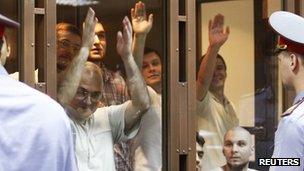Longer in jail for Bolotnaya Anti-Putin protesters
- Published

Ten of 12 Russians being tried over clashes at a rally against President Vladimir Putin last year have had their detention extended by six months.
The 10 appeared in court inside a glass cage known as an "aquarium".
The other two defendants are under house arrest, and barred from leaving Moscow, respectively.
Critics of the president say the Bolotnaya case - named after the Moscow square where the clashes occurred - is a throwback to Soviet-era show trials.
Police say protesters turned on them with metal bars and flagstones in demonstrations that began the day before President Putin's swearing-in.
Their cases are being heard at the Moscow City Court because a district court does not have an aquarium big enough to accommodate the suspects.
Thursday's hearing began what activists say is the first mass show trial in President Putin's Russia aimed against ordinary citizens, as opposed to prominent opposition figures.
'Shed blood'
The charges include mass disorder and violence against police. Some of the defendants could face eight-year jail terms.
Supporters in the court clapped and chanted "We will win" as the suspects were led into the courtroom. The preliminary hearing was closed to the media.
Georgy Satarov, a former aide to ex-President Boris Yeltsin, told Reuters news agency: "This is a Stalin-style trial. It's an attempt to use fear to stop the growth of the protest movement."
Mr Putin has said people can protest peacefully but that it is unacceptable to commit violence against police.
Ahead of the trial, state TV broadcast footage which it said showed the protests had been organised by opposition leaders and a Georgian lawmaker, with US money.
The deputy chairman of the lower house, Sergei Zheleznyak, said: "The goal was to shed blood, to provoke mass unrest and lots of deaths."
But human rights campaigner Lev Ponomaryov told the Associated Press news agency: "This is the first big political trial of Putin's Russia. It has to set a precedent to wipe out political opposition."
The Bolotnaya rally, on 6 May 2012, was the culmination of a wave of protests which began in December 2011.
They followed Mr Putin's party's victory in parliamentary elections.
'Panic'
Tens of thousands of people had marched to the square.
Mr Satarov said police pushed protesters into a confined area, causing panic.
Police say dozens of officers were hurt by rioting protesters. Hundreds of people were arrested.
Two activists have so far been jailed for plotting to foment unrest.
Former chess champion and anti-Kremlin activist Garry Kasparov has said he will stay out of his native Russia for the time being because he fears he could be put on trial.
Speaking in Switzerland, he said: "I kept travelling back and forth until late February when it became clear that I might be part of this ongoing investigation of the activities of the political protesters".
A leading activist with the United Civil Front, which Mr Kasparov heads, told the BBC that investigators in Moscow wanted to question Mr Kasparov over his role in the May 2012 protests.
Russia's Investigative Committee denied Mr Kasparov was being investigated.
Since returning to the Kremlin, President Putin has signed a string of laws apparently designed to rein in dissent and weaken civil society, including tougher punishments for unsanctioned protests and legislation that broadens the definition of state treason.
- Published24 April 2013
- Published6 May 2013
- Published4 December 2012
- Published26 October 2012